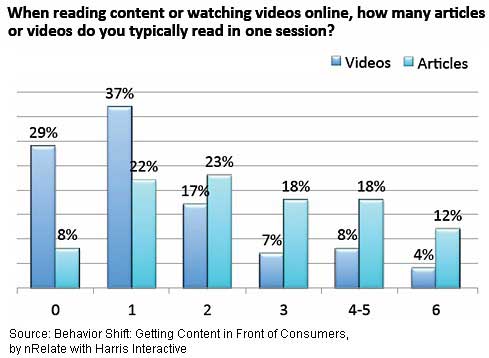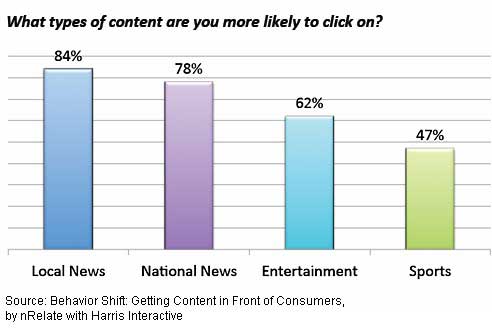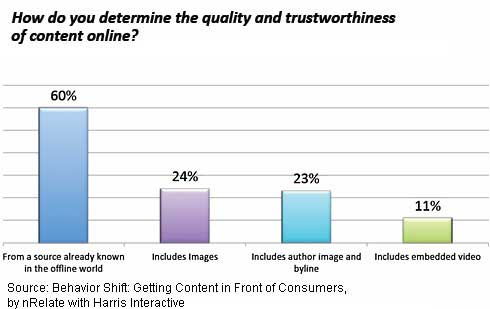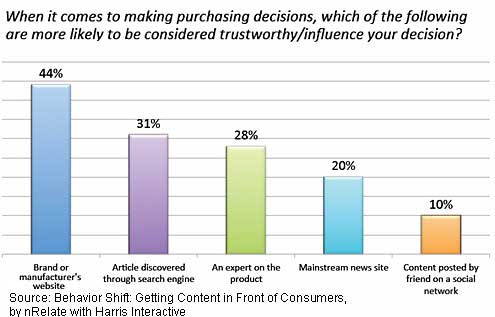More than three-quarters (76%) of online adults in the US say they have, in the previous three months, clicked on links to related stories (e.g., articles, videos, pictures) to continue reading about a topic, according to a report by nRelate.
Moreover, such related links (often located at the bottom of an article and leading to a similar one) are the second most preferred method of finding information online (28%), trumping content links recommended by friends via Facebook (8%). Search-engine results (48%) are the type of link people are most likely to click on when discovering content online.
Below, additional findings from the report titled "Behavior Shift: Getting Content in Front of Consumers," by nRelate.
Americans are gravitating toward an exploratory, contextual information-discovery process:
- 92% of online adults read content online.
- 51% say they read and click on content they receive via email newsletters from brands they trust.
- 48% say they are more inclined to click on related content after reading an article.
- 31% say search engines are not the primary sources for finding content (articles and videos).
Time Spent Consuming Content
Online adults spend an average of 7.2 hours per week discovering content; that level is higher among younger people (age 18-44).
When reading content or watching videos online, Americans typically read 3-4 articles per session and watch 2-3 videos per session. Those numbers are higher among males both for articles and for videos:

Deciding to Click
Various factors influence online consumers' decisions to click on content: 62% say they first look for traditional news stories rather than images, videos, blog posts, or any other type of related content.
After reading an article online, online consumers are more likely to click on a link to another article (34%) rather than on a video (15%), but 39% say they're more likely to click on an article if there is an image associated with it.
Moreover, the likelihood that a reader will click through to related or suggested content differs based on the source of the link (and likely the subject matter): 84% cite local-news links as those they're more likely to click on, 78% cite national-news links, and 62% cite entertainment-news link.

Nearly one-half (47%) of online consumers say they're more likely to click on sports-news links.
Content Quality Is Key
Online consumers gauge the trustworthiness of content primarily by its source, particularly if it's one they already know in the offline world (60%) and one that includes an author image and byline (23%).

Roughly one in four online consumers (24%) say they trust articles with an image, and 11% say they trust articles with embedded video.
Decisions to Purchase
Regarding purchasing decisions, online consumers say they trust content from a brand or manufacturer's website (44%) most, followed by an article discovered via search engine (31%), one authored by an expert on a topic related to the product (28%), and one they discover via mainstream news (20%).

Only one in ten (10%) online consumers say they consider content posted by a friend on a social networking site when making a purchase decision.
"No single search engine or website is the sole gateway to content discovery," said Neil Mody, CEO of nRelate. "Today it's a fragmented, highly contextual, often serendipitous process. Yet there's no arguing good content is in high demand: Consumers spend more than seven hours a week actively looking for it, viewing up to four articles and three videos per session on average. Content creators and marketers should pay special attention to this evolving behavior to maximize their visibility and reach."
About the data: Findings are based on a survey conducted online in the US, October 3-5, 2012, among 2,512 adults (age 18+) of which 2,377 were identified as online content readers by Harris Interactive via its QuickQuery omnibus product, for nRelate.




